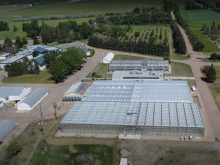As politicians from all parties scramble to support biofuel development as a sign of how green they are, the Green Party of Canada is decidedly lukewarm on the issue.
“We’re certainly not against developing biofuels but we are not gung-ho either,” said deputy Green party leader David Chernushenko. “We think there are many unanswered questions and we are saying proceed cautiously and don’t lead farmers down a blind alley with false optimism.”
During a May 8 appearance before the Senate agriculture committee studying rural poverty, the senior Green official and an Ottawa candidate for the next federal election cautioned senators not to assume the Green party is a biofuel champion.
Read Also

Alberta crop diversification centres receive funding
$5.2 million of provincial funding pumped into crop diversity research centres
“While we recognize much of the benefit in them, we are equally cautious about some of the downsides,” Chernushenko told Liberal senator Terry Mercer.
“We need to be cautious that this is not a boom-and-bust rush to biofuels where, when we discover that it is not the silver bullet to solve all our greenhouse gas problems, it does not crash just as rapidly as it started, leaving some people very vulnerable.”
Chernushenko said later it remains an open question whether there are significant environmental benefits from biofuel compared to conventional fossil fuel. It is particularly a question in use of grain feedstocks to create ethanol.
“It is very energy intensive to plant, fertilize, perhaps add pesticides, harvest, haul and process ethanol from grains like wheat and corn,” he said. “It is not like we are creating something out of nothing here.”
He said there also is the issue of the biofuel demand raising grain prices to the disadvantage of consumers, often in poor countries.
“I think the food versus fuel debate is an important one.”
Likewise, the rush to grow more grain could mean more chemical use, more use of genetically modified seed varieties and more cultivation of marginal land that should be left idle.
Green party ambivalence is in contrast to the Liberal, Conservative and NDP embrace of government support for an industry that they say will produce an environmental solution, new markets for farmers and perhaps more ability for farmers to invest in local plants and therefore buy a piece of the value-added sector.
But Chernushenko said even that could signal a problem.
“If the environmental benefits are marginal or questionable, and the only way ethanol can succeed is through continued government subsidies, then what you really end up with is another government farm program rather than an environment program,” he said.
“We support help for our farmers but that should not be the only benefit of a biofuels policy.”
He said the next generation of biofuel that uses cellulose products such as waste wood or switch grass for feedstock may be a more environmentally helpful development.
At a May 8 House of Commons agriculture committee meeting, the executive director of the Canadian Federation of Agriculture also cast doubt on the long-term farm benefit of a grains-based ethanol industry.
Justin To said the main profits will go to those who enter the business first. Canada is not in the ethanol business first, so the emphasis should be on innovation into next-generation feedstocks.
“I think there is a cause to be concerned,” he said. “As with almost anything, you can move into a niche product but that niche product becomes a commodity pretty soon, just like ethanol will.”
He said the key is research and innovation to find the next generation.
“If we stay in the same game and we produce grain-based ethanol five years from now, we’re probably going to be high-cost producers and we’re going to lose for sure.”














